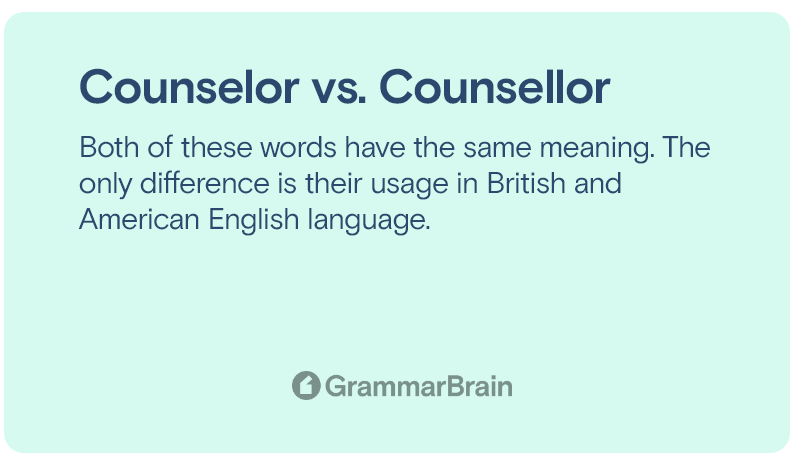Is it counsellor or counselor? Most writers and readers get confused when they hear the words ‘Counsellor’ and ‘Counselor.’ This article will help you identify the difference between the two. Here’s how:
Counsellor vs Counselor – Origin, Meanings & Difference
Both of these words have the same meaning. The only difference is their usage in British and American English language.
A counsellor or counselor is someone who offers counselling to people in the form of advice. They are way different from members of the city government.
Counsellors can come in various formats. For instance, it could be someone who offers advice on personal, legal, mental, financial, or academic issues.
The origins of the word ‘Counselor’ traces back to Middle English, which in the general sense means ‘Adviser.’ It came from an old French Conseiller.

Counsellor vs Counselor – Sentence Examples
Practicality is important. So, it only makes sense for you to see their usages in proper sentences:
Counsellor
- The school counsellors were helping students overcome mental challenges last month.
- My counsellor advised me to opt for the program. She said it would help benefit me immensely.
- We are currently seeing a counsellor. He specializes in the marriage field.
- Lucy is working as a counsellor in the UK embassy.
- The company is in a dire need for a financial counsellor.
- My daughter is one of the best legal counsellors in London.
- I am currently working as a Grief Counsellor in Edinburgh.
- Yes, I’m married to the love of my life, Jack. He is a camp counsellor of Camp Crystal Lake.
- I have scheduled an appointment with my legal counsellor at 2PM today.
- A counsellor prioritizes two things i.e., confidentiality and well-being.
- We recently started seeing a family counsellor for Robert. He has sudden fits of rage from the silliest things.
Counselor
- A businesswoman of her calibre would definitely have a top-tier financial counsellor in her team.
- As a counselor, we are required to pass many tests before getting our license.
- She has failed as a counselor. Her license should be revoked.
- I had a crush on my camp counselor back in the day.
- Did you know that both physicians and nurses can operate as genetic counselors?
- It was the job of the camp counselor to guide the boys’ scout.
- I am forever grateful to my marriage counselor for bringing my family back together.
- My counselor helped me get rid of my anxiety and depression.
- If you are having doubts about your decision, then I would advise you to see an academic counselor.
- The counselor pointed out everything else that I was feeling but was unable to say.
Which One is More Acceptable?
There is no right and wrong answer to this because both are correct and accepted. It all depends on your geographical location.
Counsellor is used in the UK and Counselor is used in America. To be specific; a single ‘L’ is present in American English and a double ‘LL’ for British English.
And for the rest of the countries, it comes down to the type of English language that you use. For instance, Indians would use ‘Counsellor’ because they follow the British form of English.
Conclusion
So, what is the verdict? Well, you can use both depending on where you live. But both of these words possess the same meaning.
Now, ensure that you remain alerted on when to use it in a sentence.
Inside this article
Fact checked:
Content is rigorously reviewed by a team of qualified and experienced fact checkers. Fact checkers review articles for factual accuracy, relevance, and timeliness. Learn more.
Core lessons
Glossary
- Abstract Noun
- Accusative Case
- Anecdote
- Antonym
- Active Sentence
- Adverb
- Adjective
- Allegory
- Alliteration
- Adjective Clause
- Adjective Phrase
- Ampersand
- Anastrophe
- Adverbial Clause
- Appositive Phrase
- Clause
- Compound Adjective
- Complex Sentence
- Compound Words
- Compound Predicate
- Common Noun
- Comparative Adjective
- Comparative and Superlative
- Compound Noun
- Compound Subject
- Compound Sentence
- Copular Verb
- Collective Noun
- Colloquialism
- Conciseness
- Consonance
- Conditional
- Concrete Noun
- Conjunction
- Conjugation
- Conditional Sentence
- Comma Splice
- Correlative Conjunction
- Coordinating Conjunction
- Coordinate Adjective
- Cumulative Adjective
- Dative Case
- Determiner
- Declarative Sentence
- Declarative Statement
- Direct Object Pronoun
- Direct Object
- Diction
- Diphthong
- Dangling Modifier
- Demonstrative Pronoun
- Demonstrative Adjective
- Direct Characterization
- Definite Article
- Doublespeak
- False Dilemma Fallacy
- Future Perfect Progressive
- Future Simple
- Future Perfect Continuous
- Future Perfect
- First Conditional
- Irregular Adjective
- Irregular Verb
- Imperative Sentence
- Indefinite Article
- Intransitive Verb
- Introductory Phrase
- Indefinite Pronoun
- Indirect Characterization
- Interrogative Sentence
- Intensive Pronoun
- Inanimate Object
- Indefinite Tense
- Infinitive Phrase
- Interjection
- Intensifier
- Infinitive
- Indicative Mood
- Participle
- Parallelism
- Prepositional Phrase
- Past Simple Tense
- Past Continuous Tense
- Past Perfect Tense
- Past Progressive Tense
- Present Simple Tense
- Present Perfect Tense
- Personal Pronoun
- Personification
- Persuasive Writing
- Parallel Structure
- Phrasal Verb
- Predicate Adjective
- Predicate Nominative
- Phonetic Language
- Plural Noun
- Punctuation
- Punctuation Marks
- Preposition
- Preposition of Place
- Parts of Speech
- Possessive Adjective
- Possessive Determiner
- Possessive Case
- Possessive Noun
- Proper Adjective
- Proper Noun
- Present Participle
- Prefix
- Predicate



